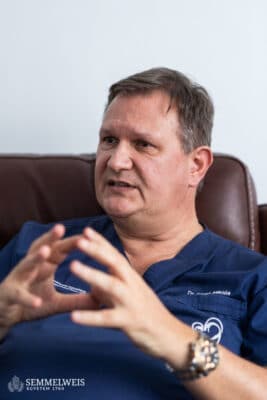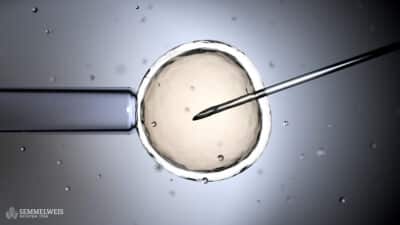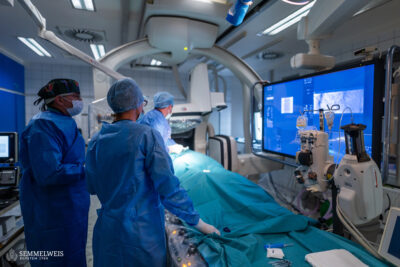 The Assisted Reproduction Center (ARC) at Semmelweis University was the first in Hungary to offer cancer patients the opportunity to participate in systematic oncofertility treatment, explained Dr. Miklós Sipos, Associate Professor and Director of the center. The oncofertility program began in 2020, alongside the launch of ARC. ARC continued to provide care throughout the coronavirus pandemic. For women under 40, eggs are retrieved and frozen after stimulation prior to anti-tumor treatment that is expected to cause significant and irreversible damage to the ovarian reserve. These eggs can then be used for artificial insemination once the tumor therapy has been successfully completed. In some cases, it is also possible to freeze embryos, usually at the blastocyst stage.
The Assisted Reproduction Center (ARC) at Semmelweis University was the first in Hungary to offer cancer patients the opportunity to participate in systematic oncofertility treatment, explained Dr. Miklós Sipos, Associate Professor and Director of the center. The oncofertility program began in 2020, alongside the launch of ARC. ARC continued to provide care throughout the coronavirus pandemic. For women under 40, eggs are retrieved and frozen after stimulation prior to anti-tumor treatment that is expected to cause significant and irreversible damage to the ovarian reserve. These eggs can then be used for artificial insemination once the tumor therapy has been successfully completed. In some cases, it is also possible to freeze embryos, usually at the blastocyst stage.
If anti-tumor treatment is urgently required or if the age of the cancer patient precludes egg stimulation treatment or vaginal ultrasound-guided egg retrieval, it is also possible to freeze ovarian tissue. This procedure is performed by a working group based in the Baross Street section of the Department of Obstetrics and Gynecology (ARO). The attending oncologist or oncology team will initiate fertility preservation treatment (at oncofertilitas.arc@semmelweis.hu), which is available free of charge and without waiting time. For men, it is possible to freeze semen or testicular tissue samples until the age of 50.
 “Between February 2020 and August 2025, we treated 120 female patients undergoing anti-cancer treatment in 154 treatment cycles at ARC, with four treatments currently in progress. We froze 897 eggs and 184 embryos and performed 21 embryo transfers, resulting in ten pregnancies. Six of these have already resulted in live births, and three are ongoing. One patient conceived spontaneously, and the child has already been born; and we lost one patient,” said Dr. Miklós Sipos, presenting the relevant statistics. In more than 55 percent of cases, female oncofertility treatment was required due to breast cancer. Lymphoma and other gynecological tumors were also significant, accounting for 13 percent of cases each. As regards men, consultations were held with 72 patients, testicular tissue was frozen in 3 instances, semen samples were frozen in 69 cases, and the partners of two patients became pregnant and gave birth to healthy children, reported Dr. Miklós Sipos on the results. Almost 30 percent of cases required preservation procedures due to testicular cancer. Lymphoma and leukemia cases were also treated in the ARC program, accounting for 26 and 31 percent, respectively.
“Between February 2020 and August 2025, we treated 120 female patients undergoing anti-cancer treatment in 154 treatment cycles at ARC, with four treatments currently in progress. We froze 897 eggs and 184 embryos and performed 21 embryo transfers, resulting in ten pregnancies. Six of these have already resulted in live births, and three are ongoing. One patient conceived spontaneously, and the child has already been born; and we lost one patient,” said Dr. Miklós Sipos, presenting the relevant statistics. In more than 55 percent of cases, female oncofertility treatment was required due to breast cancer. Lymphoma and other gynecological tumors were also significant, accounting for 13 percent of cases each. As regards men, consultations were held with 72 patients, testicular tissue was frozen in 3 instances, semen samples were frozen in 69 cases, and the partners of two patients became pregnant and gave birth to healthy children, reported Dr. Miklós Sipos on the results. Almost 30 percent of cases required preservation procedures due to testicular cancer. Lymphoma and leukemia cases were also treated in the ARC program, accounting for 26 and 31 percent, respectively.
Dr. Miklós Sipos emphasized that this opportunity could be of great help to many couples in these physically and emotionally demanding circumstances. He added that this service had been launched in the clinical centers in Szeged and Pécs this year, making it available nationwide. The director pointed out that, according to Hungarian statistics, many oncology patients of childbearing age received combined treatment that could cause a significant decline in fertility. He added that it was important that they could consult with a specialist who could explain what the treatment involved and the opportunities it offered. Dr. Miklós Sipos shared that ARC had a patient who found the strength to endure her taxing chemotherapy treatment knowing that her frozen embryos were “waiting for her.” She is currently pregnant after undergoing fertility preservation three years ago due to breast cancer.
Eszter Keresztes
Translation: Judit Szabados-Dőtsch
Photo by Bálint Barta – Semmelweis University; cover and illustration: iStock


